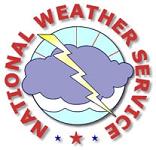Virtual Tour Navigation: Go Back | Go Forward | Tour Directory
Page: 1 2 3 4 5 6 7 8 9 10 11 12 13 14 15 16 17 18
Who do we serve ?

Everyone in the United States is our customer:
- citizens
- business and industry including private meteorologists
- media (TV stations, radio stations, newspapers, internet media, etc.)
- user groups such as the aviation, agricultural, transportation, marine, and recreational communities
- academia
- local, state, and federal government
Here are some examples of how we serve our customers:
- Citizens and other user groups who need weather information: Through NOAA All Hazards Weather Radio, satellite transmissions, the internet, and the broadcast media, we provide weather, hydrologic, and climate forecasts and warnings. The information is used in a wide variety of ways based on our user's needs.
- Aviation Community: Our office issues five airport terminal forecasts (Terminal Aerodrome Forecast, or TAFs) at least four times daily. The airports are located in Fayetteville, Greensboro, Raleigh-Durham, Rocky Mount and Winston-Salem.
- Academia, Business and Industry: We collect a wide variety of meteorological and hydrologic data including temperatures, precipitation, sky cover, radar data, weather balloon data, and much more and send it to the National Centers for Environmental Information (NCEI) for archiving. Anyone who needs weather data can request this information directly from NCEI to use in a variety of ways including atmospheric research, climate and risk calculations, disaster mitigation, and planning. We also collaborate with several universities and institutions in a variety of research studies.
- Local, State, and Federal Agencies: We not only provide routine weather, hydrologic, and climate forecasts and warnings for these agencies, but during significant storms or critical weather, we coordinate and provide detailed briefings, forecasts and warnings.
